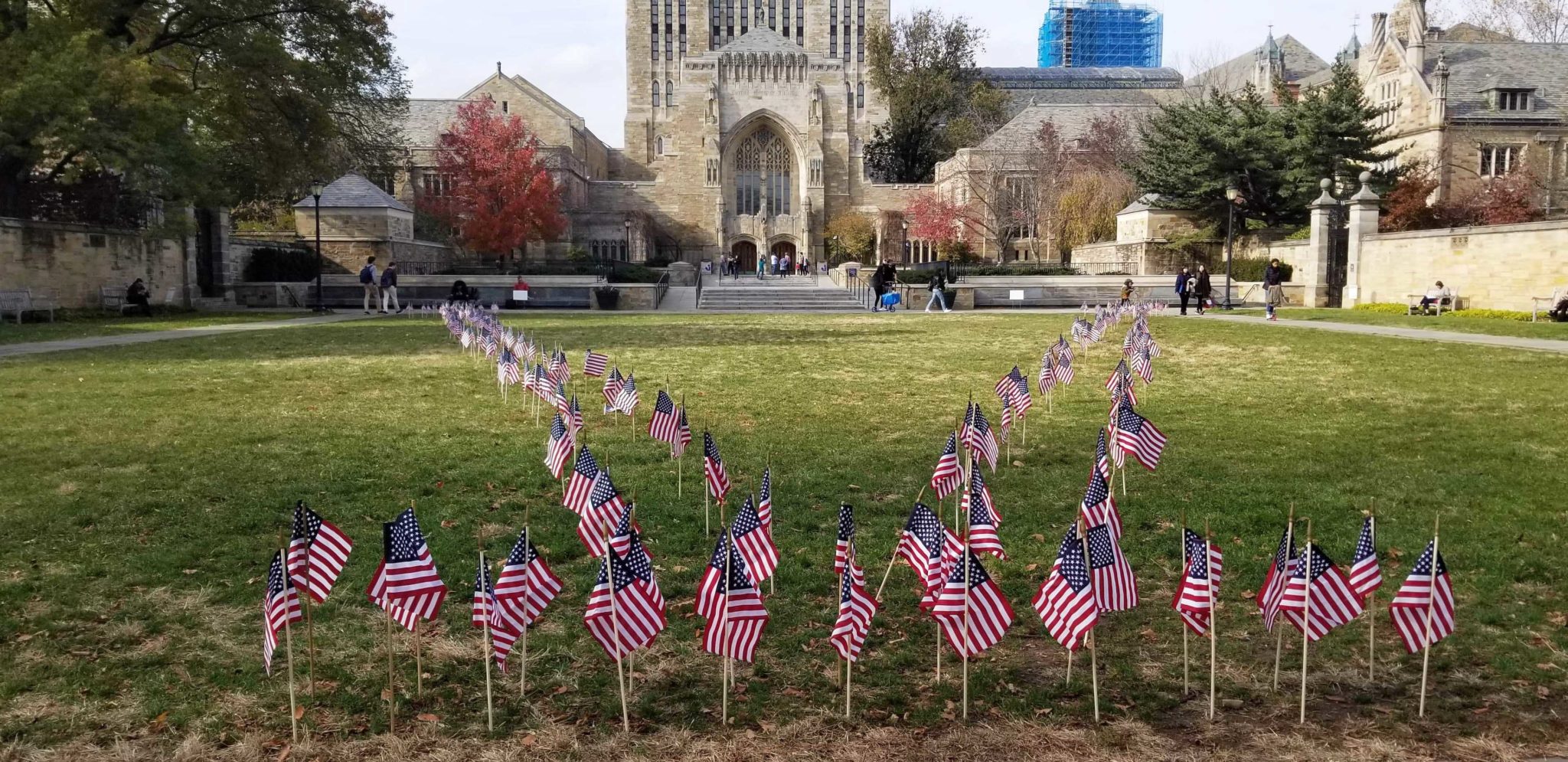
Evan Gordon
When Army veteran Jake Fischer ’20 walked across Cross Campus on Veterans Day last week, he noticed latex gloves covered in red paint strewn across rows of miniature American flags.
Offended by what he saw, Fischer — who served in Alaska and Afghanistan between 2012 and 2016 — texted his fellow students in the Eli Whitney Program, many of whom had just attended the annual Veterans Day ceremony in Battell Chapel. Shortly thereafter, another Army veteran, Evan Gordon ’22, removed the gloves from the grass.
Last week, many members of the Yale community denounced what they saw as an overly disrespectful and incendiary protest and affirmed their support for veterans. While the protestor did not immediately claim responsibility for the act, Casey Odesser ’20 took credit in a statement to the News on Saturday. Amid campus conversations about the bizarre act on Veterans Day, Yale College Dean Marvin Chun said the demonstration brought up the question of how students should stage protests.
“I think there’s still a very large space in which students can respectfully protest, and that’s basically all we ask students to do,” Chun said. “Use that large space, express your views, but in ways that don’t intrude on other people’s opinions and the ability to express themselves.”
On Wednesday, Fischer penned an op-ed addressing the University’s culture of activism, which he said contains a “toxic subset of protesters.” Titled “Bloody hands on Veterans Day,” the op-ed said Monday’s demonstration was both “intellectually lazy” and “incredibly disrespectful” to service members. Fischer posted a link to the op-ed on Facebook, which by Sunday evening had garnered hundreds of likes, comments and shares.
“I wanted to bring attention to the protest, so that whoever did it wouldn’t be emboldened to expand their actions and to make Yale a hostile place for veterans,” Fischer told the News. “Most students didn’t hear it happened, and their silence could have encouraged escalation.”
Odesser staged the Veteran’s Day protest alone. Odesser stated in an interview that the idea for the gloves demonstration spontaneously occurred while leaving class on Monday.
In an email to the News, Odesser provided a statement hoping to “clarify a few things” to mitigate people’s anger and “point [them] towards the substance of [the] performance.”
Odesser began the statement by quoting Fischer’s op-ed, in which he wrote about treating Afghan critical trauma patients. Odesser wrote that their protest was intended to both honor and remind people of “those who have and will die at the hands of the [U.S.] state,” such as citizens of Afghanistan. The statement cited events in Gaza and Bolivia as a means of highlighting the American public’s perceived apathy regarding U.S. military actions abroad. Odesser was inspired by anti-war veterans’ groups like Veterans for Peace and Iraq Veterans Against the War, the protestor added.
“It is [important] to recognize the trauma that veterans experience in war, and in no way did I mean to disrespect those who may be reflecting,” Odesser wrote. “But, it’s nationalist propaganda to divorce this conversation from its context — which is the toxic force of the U.S. military, not the protest. It is in everyone’s interest, including veterans, to divest from the military, and begin using other tactics of socio-political diplomacy.”
Odesser has staged controversial protests in the past. Earlier this month, Odesser was one of five students who staged a protest outside Professor Emma Sky’s class, distributing pamphlets calling the professor a war criminal.
Gordon — who served overseas three times in his seven-year Army career — said that after Monday’s protest, the veteran community has focused more on the outpouring of student support rather than on the demonstration itself. Still, he said that veterans did not need to be reminded of the impact war has on the innocent, adding that service members know war “is hell.”
“I am a patriot, I love my country and I’ve been willing to live with bloody hands in the defense of my nation and its people since I was 17 years old,” Gordon wrote in an email to the News.
In an interview with the News, Moses Cho ’20 — a Marine Corps veteran who was deployed twice between 2010 and 2014 and delivered Monday’s keynote address — said that Odesser’s protest served no purpose because its message was not readily apparent. Cho added that the demonstration felt like “a slap in the face.”
Both Gordon and Cho said that one reason they served in the military was to protect a nation whose citizens have the right to exercise free speech — even speech that they personally disagreed with.
Director of the Eli Whitney Students Program Risa Sodi did not respond to a request for comment.
Students are eligible to apply to the Eli Whitney program if their education has been interrupted for a minimum of five years and they have not yet received bachelor’s degrees.
Olivia Tucker | olivia.tucker@yale.edu







